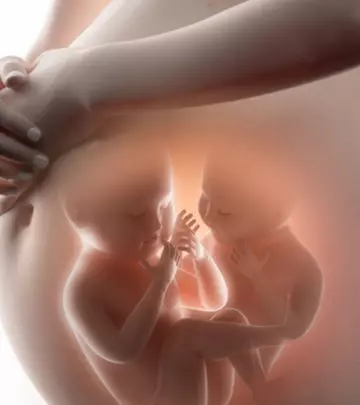
Image: Shutterstock
Every pregnancy comes with its set of ups and downs, and the complications of twin pregnancies are no different. If you are pregnant with twins, you may be well aware of the double trouble coming your way with more of everything, including the diapers.
Many women pregnant with twins may be concerned about any potential difficulties associated with having twins. If you have the same thoughts, scroll through to know about common complications experienced during a twin pregnancy.
Common Complications Associated With Twin Pregnancy
As your womb carries an additional fetus during twin pregnancy, it increases your chance of experiencing some pregnancy complications, such as:
1. Preterm Labor/Delivery:
- When the delivery occurs before 37 completed weeks of pregnancy, it is termed as preterm delivery.
- The length of gestation decreases, as you carry the additional fetus in your womb.
- Research concludes that almost 60% of twin pregnancy risks end with preterm delivery.
- Preterm labor results with premature rupture of the ovarian membranes. As a result, the onset of the labor starts in less than 37 weeks of pregnancy.
- The body of the premature twins does not develop properly. The organs are not fully mature, and the babies are usually small and of low birth-weight.
- As the organs remain ill-developed, the babies require medical attention for eating, breathing, fighting infection and staying warm.
- Premature babies remain vulnerable to infectious germs and thus they need special medical attention.
- Premature twin babies often need special care in a neonatal intensive care unit (NICU) (1).
2. Low-Birth-Weight:
- Doctors often associated low birth weight of your twins with the preterm delivery.
- The birth-weight of your babies is less than 5.5 pounds (2,500 grams).
- Twin babies with low birth weight are at higher risks of experiencing long-term health complications. The risks of twin pregnancy include hearing loss, vision problem, cerebral palsy and mental retardation (2).
3. Intrauterine Growth Restriction (IUGR):
- One of the complications with twin pregnancy, is the growth rate of your twins begins to slow at 30 to 32 weeks. IUGR occurs during such a phase when the placenta cannot handle any more growth of your twins.
- As both the babies compete to obtain a sufficient amount of nutrients, your body cannot handle the growth process anymore.
- Your gynecologist detects the onset of IUGR with ultrasound and measures the size of your abdomen.
4. Preeclampsia:
- During a twin pregnancy, you are at higher risk of developing preeclampsia and Pregnancy Induced Hypertension (PIH).
- With adequate prenatal care, you can decrease your risk of developing a serious problem from preeclampsia.
5. Gestational Diabetes:
- Gestational diabetes is a common occurrence in twin pregnancy. The two placentas increase the resistance towards insulin production and your body experiences a sudden increase in the blood sugar level.
- Some other factors to cause gestation diabetes in twin pregnancy include greater placental size and elevated levels of the placental hormones.
6. Placental Abruption:
- Placental abruption is more likely to occur in twin pregnancy as compared to single pregnancy.
- The increased risk of developing preeclampsia imposes ruptures of the membranes and sudden placental abruption.
- Placental abruption imposes a serious condition where the placenta detaches from your uterine wall before delivery.
- Placental abruption mostly occurs during the third trimester of pregnancy.
- It significantly increases your chances of delivering your first baby vaginally.
- Medical practitioners often link placental abruption with smoking, intake of harmful drugs and malnutrition.
- You can overcome placental abruption in twin pregnancy by taking a well-balanced diet and following proper prenatal care measures (3).
7. Fetal Demise Or Loss:
- Intrauterine fetal demise is rare to occur. Your gynecologist examines your health condition and decides whether medical intervention is required or not.
- If your pregnancy is dichorionic and you have fraternal twins, then the intervention is not conducted immediately.
- But if your pregnancy has a single chorion, immediate delivery is recommended in case of fetal demise.
8. Birth Defects:
- Twin pregnancy increases the risks of congenital abnormalities in your newborn twins.
- Some of the common birth defects usually experienced are heart abnormalities, neural tube defects (like spina bifida) and gastrointestinal disorders.
9. Twin-To-Twin Transfusion Syndrome:
- It is the medical condition that usually develops only with identical twins sharing the same placenta.
- The blood vessels present within the placenta supply blood and oxygen from one fetus to the other.
- In TTTS, the blood flow shunts from one fetus to the other through the common blood vessel connections. Over time, the recipient fetus receives an excess supply of blood than the other one. It overloads the cardiovascular system and increases the levels of amniotic fluid.
- The donor fetus does not get enough quantity of blood and thus has lesser amounts of amniotic fluids.
- Gynecologists treats Twin-to-twin transfusion syndrome during gestation by withdrawing the excess fluid using a needle (4).
10. Cord Entanglement:
- The cord tangles within the amniotic sac shared by the identical twins.
- In such cases, the doctor monitors the growth rate of the fetuses during the third trimester. If there seems any complexity, the doctor recommends preterm delivery.
11. Cesarean Delivery:
- Abnormal fetal positions often increase the chances of cesarean delivery.
- But in most cases, twin delivery occurs vaginally, and it entirely depends on the positioning of the fetuses.
12. Postpartum Hemorrhage:
- The large placental area and the over-distended uterus imposes a higher risk of postpartum hemorrhage. You may experience severe bleeding during and after your delivery.
Important Tips To Remember
Here are some helpful tips that enhance your well-being during twin pregnancy.
- Familiarize yourself with the warning signs and symptoms of preterm labor and preeclampsia.
- The total weight you gain during your twin pregnancy, especially before 20 weeks, is vital. You need to put on a healthy weight that reduces your risk of premature labor and low birth weight.
- Remember to intake a well-balanced diet and drink plentiful amounts of fluid to keep yourself hydrated. Staying fit and healthy helps you cope with the potential pregnancy complications associated with a twin pregnancy.
- Due to increased blood flow occurring in a twin pregnancy, your iron level drops suddenly. You may suffer from acute anemia that is harmful to both you and your growing fetuses. Your doctor may recommend the intake of iron supplements on a regular basis.
- Remember to attend your antenatal appointments regularly. The gynecologist performs regular checkups to keep a close track of your babies’ health and the existence of any potential problems.
Frequently Asked Questions
1. Do twins have more health problems later in life?
Twins may be at a higher risk of experiencing certain health issues, such as problems with blood pressure, later in life (5).
2. Is being pregnant with twins more difficult?
If you are pregnant with twins, you may experience stronger symptoms than women with singleton pregnancies. You may need special antenatal care and multiple scans and have a higher risk of developing the usual pregnancy complications (6).
3. Does twin pregnancy make one more tired?
The exhaustion from providing for more than one baby may make the mother carrying twins tired more often (7).
4. What percentage of twin pregnancies end in miscarriage?
Spontaneous pregnancy loss has been observed in 17.1% of all twin pregnancies (12.1% vanishing twins and 5% complete miscarriages) (8).
References
- Multiple Pregnancy: The Management of Twin and Triplet Pregnancies in the Antenatal Period.
https://www.ncbi.nlm.nih.gov/books/NBK83112/ - Low Birth Weight.
https://www.urmc.rochester.edu/encyclopedia/content.aspx?ContentTypeID=90&ContentID=P02382 - C V Ananth et al.; (2001); Placental abruption among singleton and twin births in the United States: risk factor profiles.
https://pubmed.ncbi.nlm.nih.gov/11296149/ - Twin-to-twin transfusion syndrome.
https://medlineplus.gov/ency/article/001595.htm - Being Pregnant With Twins, Triplets And Other Multiples.
marchofdimes.org/complications/being-pregnant-with-twins-triplets-and-other-multiples.aspx#:~:text=They%27re%20also%20more%20likely - Pregnant with twins.
https://raisingchildren.net.au/pregnancy/health-wellbeing/twin-pregnancy/pregnant-with-twins - Twins Pregnancy Symptoms.
https://americanpregnancy.org/healthy-pregnancy/multiples/twin-pregnancy-symptoms/ - Philippe Tummers et al.; (2003); Risk of spontaneous abortion in singleton and twin pregnancies after IVF/ICSI.
https://pubmed.ncbi.nlm.nih.gov/12871890/#:~:text=The%20overall%20incidence%20of%20spontaneous













